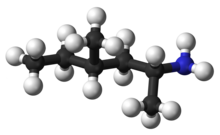|
1,3-二甲基戊胺
甲基己胺(又称1,3-二甲基戊胺、1,3-DMAA、二甲基戊胺和DMAA;商品名Forthane和Geranamine)是一种由礼来公司发明并研发的间接拟交感神经药,自1948年以来作为一种吸入型鼻塞缓解剂投放市场,但于1970年代被停止销售。[2] 自2006年以来,甲基己胺以许多名称作为兴奋剂或提高能量的补剂广泛销售,据说是因为它类似于老鹳草中的某些化合物,但因具有数个不良副作用而受到质疑,至少有五个死亡与含甲基己胺的补剂有关。[3]它被许多运动管理局和政府机构禁止。即使FDA已发出几封警告信,[4]截至2019年,这种化合物仍出现于运动和减肥补剂中。[5] 参见参考文献
外部链接
|
||||||||||||||||||||||||||||||||||||||||||||
Index:
pl ar de en es fr it arz nl ja pt ceb sv uk vi war zh ru af ast az bg zh-min-nan bn be ca cs cy da et el eo eu fa gl ko hi hr id he ka la lv lt hu mk ms min no nn ce uz kk ro simple sk sl sr sh fi ta tt th tg azb tr ur zh-yue hy my ace als am an hyw ban bjn map-bms ba be-tarask bcl bpy bar bs br cv nv eml hif fo fy ga gd gu hak ha hsb io ig ilo ia ie os is jv kn ht ku ckb ky mrj lb lij li lmo mai mg ml zh-classical mr xmf mzn cdo mn nap new ne frr oc mhr or as pa pnb ps pms nds crh qu sa sah sco sq scn si sd szl su sw tl shn te bug vec vo wa wuu yi yo diq bat-smg zu lad kbd ang smn ab roa-rup frp arc gn av ay bh bi bo bxr cbk-zam co za dag ary se pdc dv dsb myv ext fur gv gag inh ki glk gan guw xal haw rw kbp pam csb kw km kv koi kg gom ks gcr lo lbe ltg lez nia ln jbo lg mt mi tw mwl mdf mnw nqo fj nah na nds-nl nrm nov om pi pag pap pfl pcd krc kaa ksh rm rue sm sat sc trv stq nso sn cu so srn kab roa-tara tet tpi to chr tum tk tyv udm ug vep fiu-vro vls wo xh zea ty ak bm ch ny ee ff got iu ik kl mad cr pih ami pwn pnt dz rmy rn sg st tn ss ti din chy ts kcg ve
Portal di Ensiklopedia Dunia

